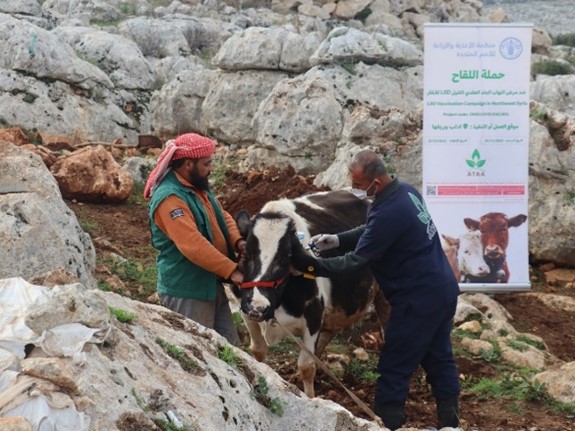FAO completes mass vaccination campaign against Lumpy Skin Disease in Northwest Syria

A dairy cow belonging to a smallholder farmer in Maaret Tamsrin, Idleb governorate, is vaccinated against LSD as part of FAO’s campaign in Northwest Syria.
©FAO
With the generous support of the Kingdoms of Belgium and Sweden, FAO has successfully completed a mass vaccination campaign to protect the entire smallholder dairy cattle population across 35 accessible sub-districts in Aleppo and Idleb governorates against Lumpy Skin Disease (LSD).
In close collaboration with its Syrian NGO partners, the Organization successfully vaccinated a total of 27 754 cattle belonging to 7 906 households, thereby exceeding the minimum 80 percent coverage required to prevent outbreaks of the disease.
As part of the campaign, 23 local veterinarians and veterinary technicians received training on best practices in vaccine administration and cold chain management, and all beneficiary households received essential information on dairy cattle health management.
LSD is a Transboundary Animal Disease (TAD) affecting cattle that is transmitted by blood-feeding insects such as certain species of flies and mosquitoes, and ticks. The disease can significantly impact rural livelihoods that depend on cattle by inducing a reduction in milk production, temporary or permanent sterility in bulls and fertility issues in cows and, in certain instances, death. Although historically limited to sub-Saharan Africa, the disease has been progressively spreading to new territories in the Middle East and Türkiye, and 2019 witnessed a major outbreak of the disease in Syria that resulted in significant losses to milk production and cattle herds.
Dairy cows are the most valuable livestock assets owned by smallholder farmers in Northwest Syria. Cow’s milk is a regular income source for many households across the country, particularly for rural women. It is also a key contributor to household nutrition. However, awareness of LSD has eluded many smallholder farmers, as highlighted by one beneficiary:
"Last year we suffered from a disease, and we did not know what it was. The disease caused nodules in the animal's body. Recently, we learned that this was LSD. No treatment for this disease was available. We lost a calf weighing 400 kilograms. We isolated him alone and did our best to find a treatment. The problem is that LSD does not respond to any treatment; the animal needs to be vaccinated beforehand. Through FAO’s campaign we learned about this vaccine and our cows were vaccinated. It is good that the vaccine is safe and does not affect pregnancy, birth, the ability to walk, or anything else."
-Mohammed Shuhud, 31, Aulan village, northeastern Aleppo governorate
In response to 13 years of continuous conflict – compounded by two devastating earthquakes in February 2023 – FAO is providing critical livelihood support to food-insecure households in Northwest Syria from its crossborder office based in Gaziantep, Türkiye. According to Ruwan Ubeysekara, head of FAO’s Northwest Syria Crossborder Operations, “This LSD vaccination campaign is among our many efforts to protect the productive assets and build the resilience of vulnerable households in this highly affected part of the country. Moreover, in an environment of decreasing humanitarian funding, it has become even more critical to protect rural livelihoods and strengthen the capacity of households to meet their food needs.”
FAO continues to seek additional funding to protect livestock in Northwest Syria against other diseases – including Peste des petits ruminants (PPR), sheep pox and goat pox, foot-and-mouth disease (FMD) and Newcastle Disease – to ensure their control within Syria and prevent their spread to neighbouring countries.
